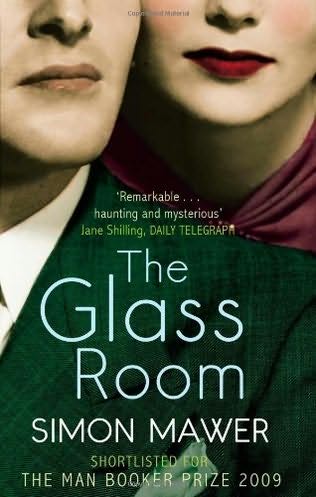
--The blurb--
"High on a Czechoslovak hill, the Landauer House shines as a wonder of steel and glass and onyx built specially for newlyweds Viktor and Liesel Landauer, a Jew married to a gentile. But the radiant honesty of 1930 that the house, with its unique Glass Room, seems to engender quickly tarnishes as the storm clouds of WW2 gather, and eventually the family must flee, accompanied by Viktor's lover and her child. But the house's story is far from over, and as it passes from hand to hand, from Czech to Russian, both the best and the worst of the history of Eastern Europe becomes somehow embodied and perhaps emboldened within the beautiful and austere surfaces and planes so carefully designed, until events become full-circle."
--The review--
Simon Mawer's The Glass Room perhaps did not capture the attention of Booker Prize judges as the ultimate winner of the prize last year, despite making the shortlist, due to its focus on World War Two - a subject on which the cup truly runneth over in British history books and fiction books alike. However, its mass popular appeal is surely instant as a result; not only is the story framed in a context that is very familiar to the majority of the great British public, but it also centres on an elegant, sad, and yet strangely cold love story.
From the very beginning of the novel, we do not have the impression that the relationship between Viktor and Liesel is a happy one. Viktor is a Landauer, of the family who makes cars of the same name, so a marriage to him is surely a good marriage in terms of social status, and it illustrates starkly how a return to traditional values, as so often demanded by the UK's right-wing press and politicians in particular, may not be all it's cracked up to be. Viktor's infidelity in the end also means that we do not much care what happens to him; readers are not as saddened or affected by his demise as they should or could be. This is, however, likely a deliberate device by Mawer to draw Liesel as the heroine.
Another strong character is Hana, but the sexual undercurrent in the relationship between her and Liesel is not entirely realistic, although their strong friendship is. Happily, this weakness is easily ignored as Mawer draws us in to the ever-tightening complexity of the family's relationships, which eventually expand to include Viktor's lover and her child from a previous relationship. The impending doom of wartime Europe creeps up on readers slowly and authentically and provides an effective and dark backdrop, making this more than just a love story.
The setting of the glass room itself is undoubtedly stunning, and while Mawer says in a short foreword that the location on which it is based will be obvious to anyone who has ever visited it, other readers who are unfamiliar with it may well be able to call to mind other similar locations that also fit the bill. For me, it was the house of art dealer Louis Carré, which is located in the French village of Bazoches-sur-Guyonne and was built by Finnish architect Aalvar Alto. The image of the glass room in the novel is compelling and symbolic in itself, quite aside from the positive momentum of the rest of the story. A weaker version of this is the line of music that Mawer repeatedly incorporates, which is delightfully Proustian but does not quite imitate the success of its literary progenitor.
Utterly absorbing, the novel is a superb introduction to Mawer's work, and to my mind is proof that even if the Booker jury do not get it right all the time, they are still achieving their aim of bringing perhaps undiscovered great modern literature to a wider audience, and honouring it.
Other works by Simon Mawer
Chimera (1989)
A Place in Italy (1992)
The Bitter Cross (1992)
A Jealous God (1996)
Mendel's Dwarf (1997)
The Gospel of Judas (2000)
The Fall (2003)
Swimming to Ithaca (2006)





No comments:
Post a Comment